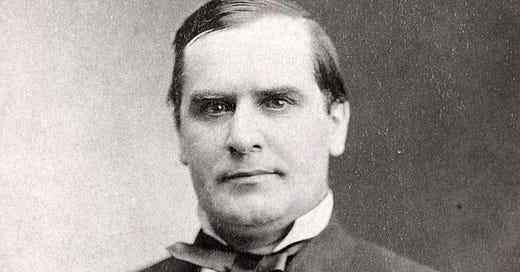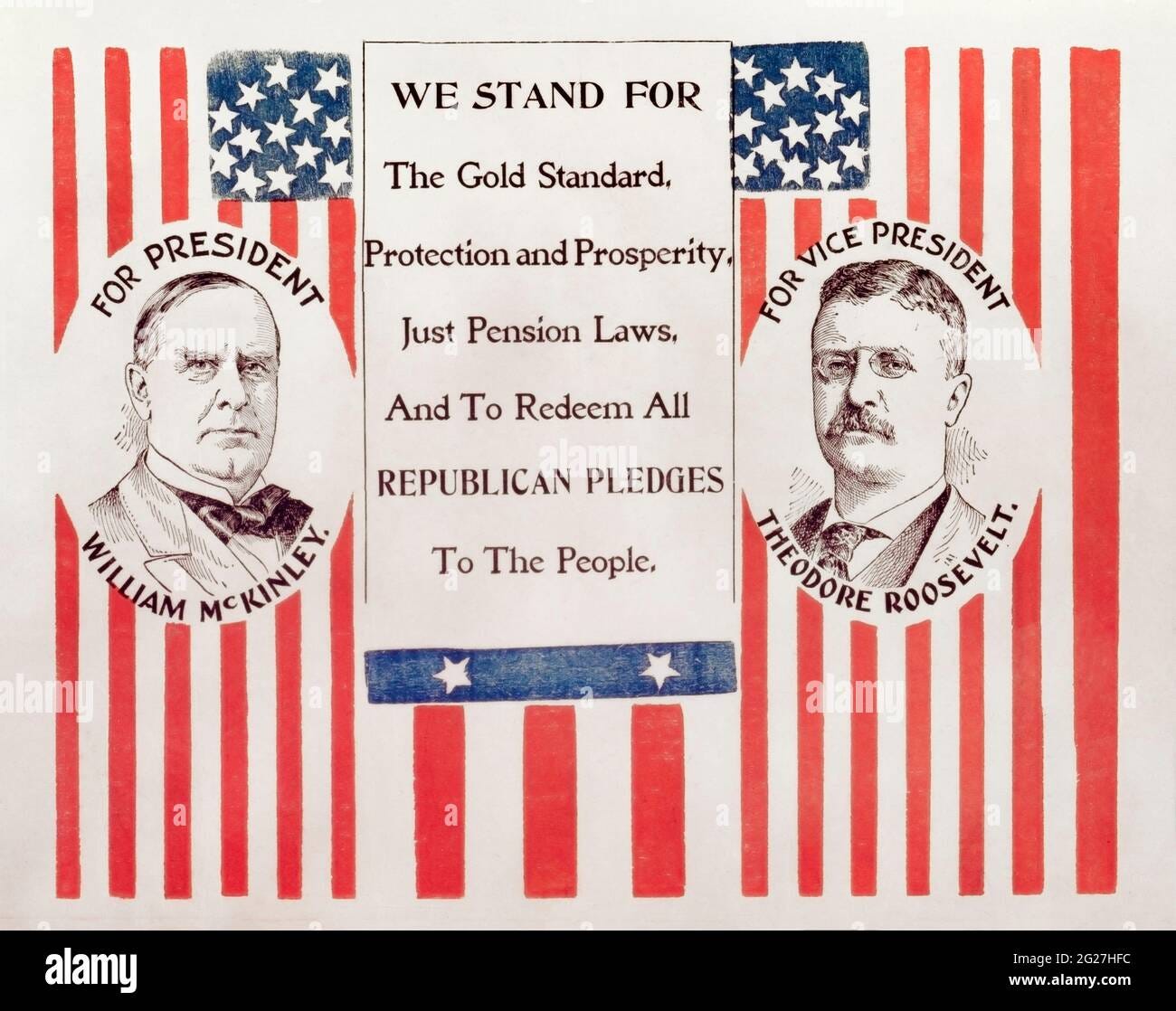That, my friends, is a picture of William McKinley, 25th president of the United States, and known by Shitler’s nickname “The Tariff King”. He even looks insane. This is why the Convicted Felon is so hot to rename Denali to “Mt. McKinley” - so he can have a place to honor one of his idols, who he adores not just for the tariff stance, but a few other things, which we’ll get to1.
Before McKinley became president, he was a Congressman from Ohio2. The time period we’re talking about is the late 1800’s. The time period from the Civil War to the turn of the century had a lot going for it in terms of improvements to the US economy and the country’s standing in the world. This is important to remember, because major changes rarely happen in a vacuum. Note: this is completely different from today’s situation. We had a solid economy until the dismantling began 2 months ago (I know, dog years), but we lack the growth that occurred from the Civil War to the turn of the century.
First, the Industrial Revolution: railroads, electricity, rudimentary communications. Second, tons of immigrants. Thus, not only were we building the infrastructure necessary to produce goods, but there was a huge potential pool of employees. We were in a period of geographic growth. When the second part of the Industrial Revolution began, we were only 35 states, with more open areas than population centers. Of note: had we not had scads of immigrants, our ability to manufacture goods, grow and distribute food, and build infrastructure, would have been limited. Remember that these conditions were really good for potential economic growth.
Very different from today. While we technically have full employment, we lack the immigrants necessary to do low paid work, and that matters if you’re trying to grow an economy. Further, employment until the 1980’s was almost completely dependent on human labour. In the past 45 years, much has become mechanized, so you need far fewer people to do things like manufacture cars, textiles, armaments, heavy equipment, semiconductors, etc. etc. etc.
In addition, our economy is dependent on government spending (it’s about 35% of GDP from all levels of government. Source.) And we know that government spending, at all levels, is about to tank.
We didn’t really have an income tax until the 16th Amendment, which was ratified in 1913. There HAD been small income taxes prior to that, like to fund the Civil War, but they were minor and often successfully challenged in court. So, tariffs helped to fund the government. COMPLETELY different from today. Especially because “The Federal Government” back in the late 1800’s didn’t do all that much, and government spending was like 3% of GDP. Much of nationwide spending could be attributed to the robber barons. Most families spent close to half of their income on food. I got that last gem from a fascinating presentation from the Bureau of Labor Statistics. Link.
Enter the McKinley Tariff Act (full text here). It was his crowning jewel as a Congressman, passed in 1890. While it excluded some items, most imports were subject to tariffs of 38% to 49.5%. The act has 450 amendments, so there are a lot of details. This was OF COURSE a Rethuglican program, and they did well in elections, and a lot of regular people didn’t like the associated inflation. (Sound familiar?)
Let’s turn our eyes to Canada, and Prime Minister Sir John Macdonald. He was PM in 1890 and saw the new US tariffs less as protectionism on the part of their southern neighbor, and more of a salvo designed to force Canada to be part of the US. Really, look it up. You’ll find a weak president in the White House, taking tariff cues from Andrew Carnegie, who wanted to annex Canada, and who was a very rich, unelected gadabout. (Remind you of anyone?)
The Canada of 1890 was very different from the Canada of 2025. It was a very new country, still developing. Despite the huge US tariffs, which caused Canadian exports to the US to drop by 50%, they found new markets in Britain and the Caribbean. Their total exports INCREASED in the aggregate over the ensuing years.
In 1896, William McKinley ran for president on a platform of tariffs as a way to make America greater. I kid you not. The “Protection and Prosperity” line in the campaign poster related directly to the aim of additional tariffs. He won.
And what happened to McKinley? In 1901, he made a speech that indicated he was going to go more for reciprocity and less for pure tariffs, he saw the error of his ways. He was shot the next day3, and while he appeared to be recovering, the doctors missed the gangrene in his stomach, and he died about a week after the shooting. His VP, Teddy Roosevelt became president, and he was, let’s say, far more liberal and populist than the Rethuglican Party had anticipated. Kinda sorta like the shock Dwight Eisenhower received after appointing Earl Warren to be Chief Justice of the Supreme Court. (Please tell me they covered this in your high school history class. If you lived through it, you know immediately.)
So what happened with tariffs? The Cliff Notes version is that Rethuglicans put them in place, Democrats decreased them, and eventually the stock market crashed 1929 and tariffs didn’t matter because no one had money to buy anything. Tariffs remained rare from the early 1930’s, and targeted, until the Convicted Felon.
So what have we learned?
Gross tariffs BAD. We don’t have the head space necessary for growth, we don’t have the workforce, and stagflation is coming.
Taking over Canada? Didn’t happen then, won’t happen now.
Republican presidents have a propensity to crash the US economy, and sometimes the world economy. (Excluding Lincoln and Eisenhower, of course.)
Now you’re all ready for “Liberation Day” tomorrow. The past is prologue. And all of us innocent people will suffer because morons and degenerates didn’t learn the lessons of history.
Sigh.
As an aside, there are fewer links than usual, because a lot of this comes from my personal college notes taken during American History 101.
In between his DC stints, he was governor of Ohio.
Not because of the tariff stance change.






Wonderful History Lesson. Brings back distant memories of High School and College classes. But, unhappily, looks like we are in a rush to a recession.